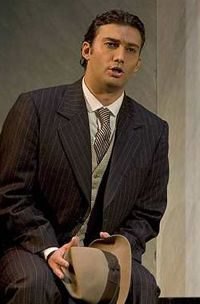|
|
|
|
|
|
|
|
| The Spectator, 4 December 2004 |
| Michael Tanner |
Puccini: La Rondine, ROH, London November 2004
|
Problem piece
|
|
 Like many artists, Puccini seems happiest when
creating beings whom he can proceed to subject to torture, while encouraging
compassion and grief on the part of spectators. In this respect he is most
like the God whom he had been brought up to believe in. Happiness, for him,
is always the temporary condition which makes pain more vivid. He is good at
creating fleeting comedy, so that when the mood darkens we sense how much
deeper he is being. In Gianni Schicchi he makes us laugh all the way to the
end only because of an omnipresent corpse, so that the piece is macabre as
much as it’s merry. That all means that Puccini was not ideally placed to
write an operetta, in which no one takes anything seriously and they all
dance through the night and don’t have a daytime life to speak of. Like many artists, Puccini seems happiest when
creating beings whom he can proceed to subject to torture, while encouraging
compassion and grief on the part of spectators. In this respect he is most
like the God whom he had been brought up to believe in. Happiness, for him,
is always the temporary condition which makes pain more vivid. He is good at
creating fleeting comedy, so that when the mood darkens we sense how much
deeper he is being. In Gianni Schicchi he makes us laugh all the way to the
end only because of an omnipresent corpse, so that the piece is macabre as
much as it’s merry. That all means that Puccini was not ideally placed to
write an operetta, in which no one takes anything seriously and they all
dance through the night and don’t have a daytime life to speak of.
No wonder he had even more trouble than usual knocking La Rondine into
shape, and not only because of the advent of the collapse of the
civilisation he knew while he was writing it. His basic problem was the
matter of tone, and the main interest the work has is that he never solved
it, so the piece remains a problem for listeners, too: how much should we
care about these characters? The one who has the toughest luck is the hero
Ruggero, an innocent who comes to Paris, sings a song in the city’s honour,
falls in love with one of its typically flighty female inhabitants, and
loses her because she is ashamed of her past. Puccini wasn’t able to give
this figure any character we can grasp or care about, which means a hole in
the centre of La Rondine.
The Swallow herself is more fully drawn, fully enough in fact for her
renunciation of Ruggero on grounds of her unworthiness to seem absurd, but
not more fully than that. The obligatory contrasting pair of lovers,
traditionally more lightweight than the central pair, can’t be more
lightweight than this central pair, so end up as mere sound-producing
organisms.
Yet there are charms in La Rondine, just enough to warrant its occasional
revival, and the Royal Opera has actually scored its biggest success of the
season so far with it. It’s somewhat better now than when it was unveiled in
2002. Emmanuel Villaume’s conducting is more relaxed, less insistently
dazzling than Antonio Pappano’s was. He is just as supportive of his
singers, and his cast is almost ideal.
Angela Gheorghiu has never been in finer form, and her singing of Doretta’s
song is enchanting, while she manages to make the phoney end of the opera as
momentarily convincing as it could ever be. Her stage presence is the most
radiant of any contemporary operatic star. But close behind is Jonas
Kaufmann as Ruggero, giving his first fully staged performance in the UK,
and showing that he is as gifted a singing actor as he is a Lieder
recitalist. Naturally graceful, he contrives in this role to be awkward and
a grateful recipient of Magda’s lessons in love, only to have his teacher
brusquely announce that their classes are over, leaving him curled up and
sobbing; it won’t be long before he recovers, we are bound to feel.
Among the rest of the cast Robert Lloyd is commanding as Rambaldo, Magda’s
‘protector’; the only annoyance is Annamaria Dell’Oste’s Lisette, making a
tiresome part insufferable. The evening left me thinking, though that can’t
have been anyone’s intention. |
|
|
|
|
|
|
|
|
|
|
|
|
|
|
|
|
|
|